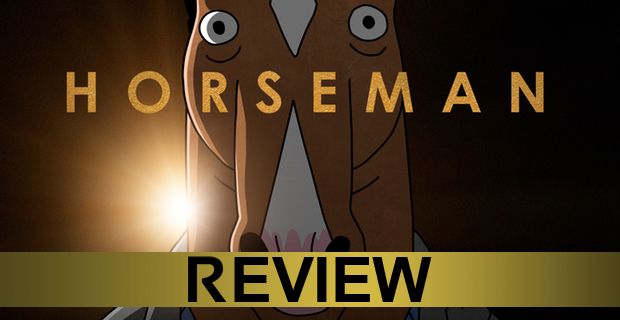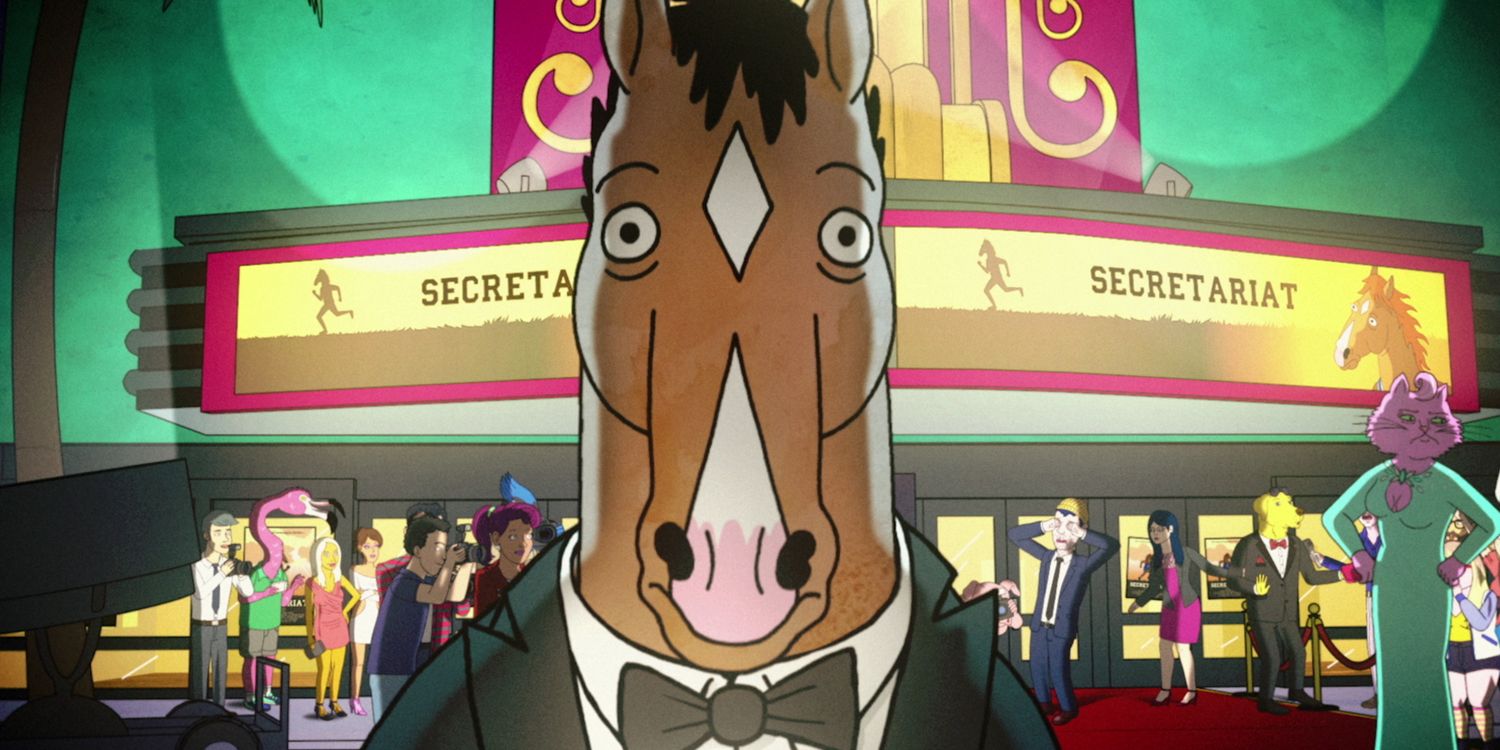[This is a review of the BoJack Horseman season 3 premiere. There will be SPOILERS.]
-
There is no better original program on Netflix than BoJack Horseman. In fact, the animated Hollywood satire is also one of the best series on TV at the moment. That's an impressive feat for an adult-oriented cartoon about an anthropomorphized horse, hanging onto the last vestiges of his late '90s sitcom fame. But since the series premiere in 2014, the show has been on a roll; delivering the sort of biting satire about the entertainment industry (J.D. Salinger producing a game show, anyone?) normally reserved for Robert Altman, the Coens, or TV series starring Tina Fey. And yet, it's not just the wall-to-wall industry jokes that make the series so engaging and so much fun to watch. The show also works as an impressive and powerful exploration of depression, one that plums some surprising depths of, yes, an animated horse-man, and winds up being emotionally uncompromising at times.
As season 3 gets underway, BoJack Horseman also exhibits a surprisingly deft hand with regard to how the overarching narrative remains serialized and yet the episodes themselves still work as single, half-hour servings that tell a complete story. It's another example of how the show is increasingly comfortable in its skin and how that comfort has led to it being the binge-worthiest series on Netflix without falling prey to the same bing-watching model shortcomings of its streaming brethren. Last season followed through with plans to see the not-quite washed-up actor take a shot a legitimate fame once again by starring in a Secretariat biopic. But it wasn't just fame BoJack sought; he also sought some sense of personal satisfaction and a way to finally claim that his life wasn't a waste, that he didn't throw it all away on a terrible sitcom and lifetime avoiding any real emotional connections.
BoJack is neck-deep in his career resurgence, basking in critical praise, getting hammered while doing press junkets, and wondering if potentially winning an Oscar will fulfill him in ways that nothing else has. Early on, it's clear that BoJack is merely in pursuit of another emotionally empty objective, one that will ultimately fail to fill the void he's been throwing booze, drugs, and sex into for so long. At this point in the series, creator Raphael Bob-Waksberg has instilled in the audience an understanding that each major event in BoJack's life will inevitably lead to a backlash that sends him into an emotional downward spiral that threatens to see him end up back at square one. However, like last season's superlative 'Escape from L.A.,' season 3 capitalizes on BoJack's growing self-awareness and how that growth conflicts with the superficiality of the goals he's set out to achieve.
And as the series' titular character becomes increasingly (perhaps reluctantly) cognizant of his emotional and psychological needs, the series, too, has become more self-aware and increasingly capable of skewering the entertainment industry, industry types, and the traditions they hold most dear. Case in point, one of the season's more prominent threads delivers a stinging blow to the world it's lampooning. After all, what better way for a former star to reclaim some of his lost glory than to take the lead in a flashy, big Hollywood biopic? The biopic is often such a deliberate, emotionally manipulative way for actors to gain (or regain) attention and, more often than not, to garner and Academy Award nomination. Season 3 makes sport of both the spectacle of the Oscars, as well as the importance that is placed on them by individuals inside the industry and out. But even while its main character and everyone around him is seemingly swept up in the phenomenon of this sudden and potentially legitimizing fame, the series never loses sight of just how fleeting happiness can be, especially when it comes from as superficial a place as winning an award.
Like he did in previous seasons, Bob-Waksberg skillfully punctures the notion of celebrity and society's obsession with it again and again. That effort becomes the vehicle through which BoJack begins to understand how the things he thinks he wants and thinks will bring him the kind of happiness and sense of self-worth he has been missing his entire life are incapable of doing so. The joke winds up being not only that he wasn't actually in the Secretariat movie on account of being in New Mexico, but that the movie hasn't even been released yet and he's already being asked what's next. Even more cynically, near the end of the premiere, BoJack's publicist breaks down his Oscar chances from a moment that will allow him the chance to be remembered forever to the chance to have one pretty darn good night.
To see BoJack falling into the idea of Hollywood awards spectacle with what is ostensibly a fraudulent movie is maybe the most cutting critique of the industry the series has made yet. And by spending the premiere listening to characters repeatedly ask BoJack – and others – "What's next?" season 3 takes BoJack Horseman into a strange place where celebrity is not about being remembered for what you've done or the value of your art – even if, in the '90s you were on a very famous TV show – but instead, it's all about being talked and keeping people talking.
-
BoJack Horseman season 3 is available in its entirety on Netflix.


